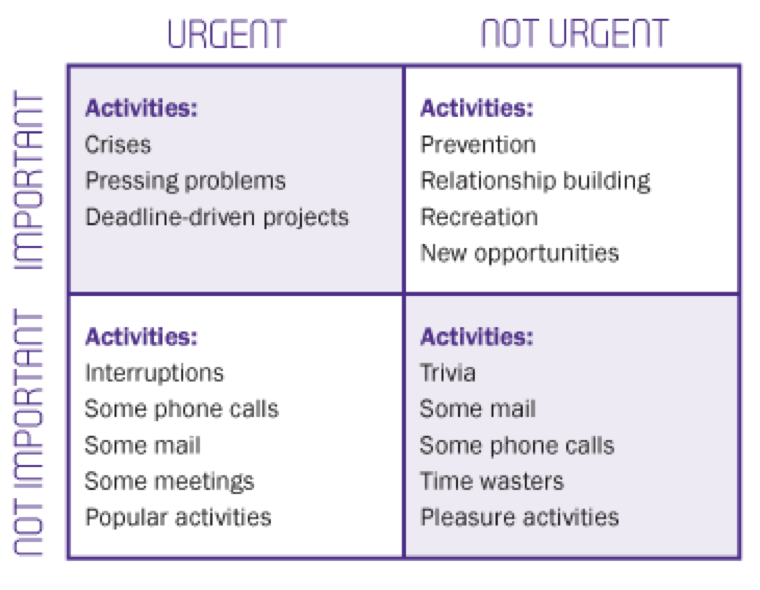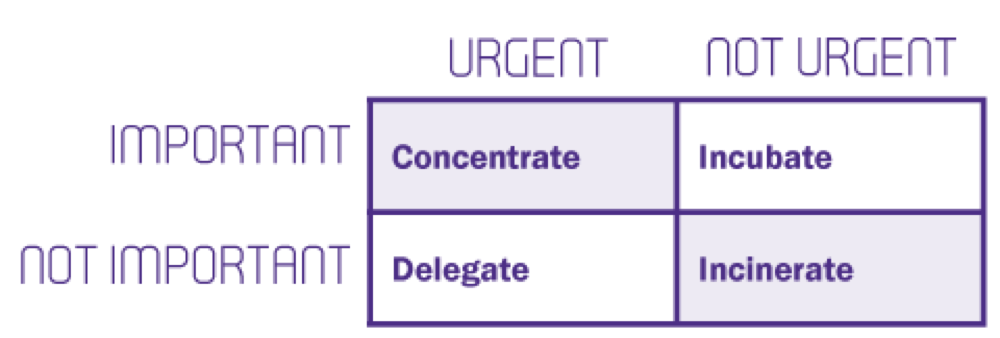Creativity & Time Management
In Dr Stephen Covey’s book ‘The 7 Habits of Highly Effective People’®, he presented the Time Management Matrix: A tool that prioritises urgent and important tasks in order for an individual to maximise their most precious asset – time.

The division between Urgent and Important is highly relevant to maximising your creative output. In the table below, you can see how we can apply the Time Management Matrix to guide creative thinking. The Creative Time Management Matrix helps you to decide what your priorities are and when you have an opportunity to incubate problems to be creative.

URGENT and IMPORTANT
Concentrate: You have no option, do it now.
Your time is limited and a quick, but a poor solution might lead to a bigger problem or missed opportunity. There is little time to think before you have to make a decision and follow your chosen course of action, so make it count. The more effort you put into exploring solutions, the better your chances of success. Use your resources, get help and maximise the number of possible solutions you can find. When you have a workable solution, consider it, evaluate it and then use your efforts to find a better one.
Working under time pressure can be a strong motivator to finding new and better solutions.
IMPORTANT but NOT URGENT
Incubate: Take your time. This is where creativity happens: thinking around the problem, generating ideas and developing solutions.
The key to incubation is to delay reaching an answer, until you have to. This will help you to make the most out of your innate processing power.
Within your processing capability you have two systems: your conscious mind and your non-conscious mind. Both help you to solve problems and work in different ways. Your conscious processor is brilliant for quick fight or flight decisions and can be developed to respond to many daily events quickly. Your non- conscious processor is much slower but much, much bigger and is constantly taking in information and working on the information you feed it. When it finds a possible solution it gives you an illuminative or ‘eureka’ moment. Whether you are trying to remember someone’s name or considering an idea for a 10-year project, the longer you incubate and feed your ideas, the more solutions you will create, leading to a better outcome.
Over 90% of Nobel Prize winners report that they find their breakthrough idea when they have been working on a problem and then switch off. This is so common it has been termed the Bed, Bus, Bath syndrome.
URGENT but NOT IMPORTANT
Delegate: You are in control, do not waste your time.
Do you need to do this? If yes, then use your creative resources to find a quick way to get it sorted. Time invested here could be a total waste, so if you do not have someone to delegate to. Use your creative resources to find a better way….call a taxi, find a service provider, remove the urgency, take control.
NOT IMPORTANT and NOT URGENT
Incinerate: Discard the distractions you could do without.
Make tough decisions: what can be discarded? A quick decision now can save you time and focus your priorities.
Avoid being buried with things that ‘might possibly be useful later’. In these days of Internet searchability you can broaden your creative horizons by keeping an ‘interest’ list and scheduling some time to search, find and play. You are guaranteed to find more ideas than you started with.
The more you discard, the more time you can devote to the creative zone and make creativity an active part of your time management processes.